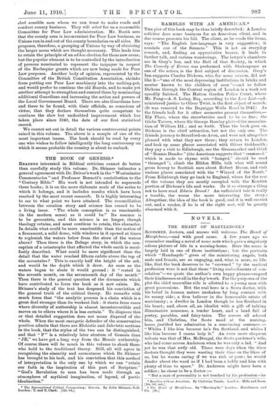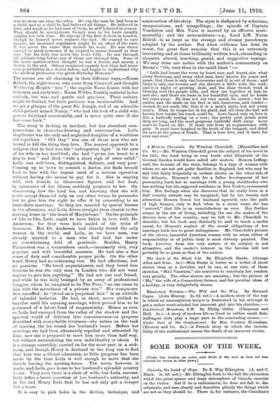NOVELS.
THE HEART OF MA.RYLEBONE.t
SCOTSMEN, doctors, and nurses will welcome The Heart of Marylebone,—and with good cause. A few years ago we remember reading a novel of some note which gave a singularly odious picture of life in a nursing-home. Here the scene is largely laid in one of those institutions ; but the portraits which " Handasyde " gives of the ministering angels, both male and female, are so engaging, and, what is more, so life- like, that the book deserves to be "crowned " by the medical profession were it not that these "living embodiments of con- solation"—we quote the author's own happy phraseregard their kindnesses as all in the day's work. For the purposes of the plot the chief masculine role is allotted to a young man with great possessions. But the real hero is a Scots doctor, with his belief in human nature unshaken by long contact with its seamy side ; a firm believer in the honourable estate of matrimony ; a dweller in London though he has Scotland in his heart; and, above all, an idealist with a gift of talking illuminative nonsense, a tender heart, and a head full of poetry, parables, and fairy-tales. The nurses all adored him, and Christina, the Scots maid at the nursing- home, justified her admiration in a convincing sentence :— " Whiles I like him because he's fra Scotland, and whiles I like him because I canna help it." An even more eloquent tribute was that of Mrs. McDougal, the Scots gardener's wife, who had come across Anderson when he was only a lad. " And yet be was that awfy old. Those were days when the ither doctors thought they were wasting their time on the likes of ns, but he wasna caring if we was rich or poor; he would dander about the ward as if I had been a leddy and him with plenty of time to spare." Dr. Anderson might have been a soldier ; he chose to be a doctor :- " But a man of personality is not touched by his profession—he • Rambles with an Anterican. By Christian Tearle. London : Mills and Boon. [10s. 6d. net.] t The Heart of Marylebone. By " Handasyde." London : Hutchinson and Co. [6s.] was no more one than the other. He was the man he had been as a child, and as a child he had believed all things. He believed in love; and much as he had seen of them, he still believed in women. They should be synonymous, though man in his haste usually couples her with wine. He was one of the first doctors in London, though he himself never realised the fact. He wanted to cure people ; his increased reputation might be an effect of the cure, it was never the cause that incited his work. He was clever enough to speak nonsense if he wanted to amuse himself in that way ; but his folly was never the fool's folly. He saw through his patients long before any of them saw through him. Some of the more matter-of-fact thought he was a doctor, and merely a doctor, to the end. Others wondered vaguely how they had never seen possibilities in a doctor before, and began to understand why the medical profession was given Birthday Honours."
The nurses are all charming in their different ways,—Nurse • Ridrid, the night-nurse, who came from Cornwall and thought
Wuthering Heights "nice" ; the angelic Nurse Lister, with her blue eyes and curly hair ; Nurse Wilder, frankly material in her outlook, but wise and gentle and gracious. Their culture
might be limited, but their patience was inexhaustible. And we get a glimpse of the great Sir Joseph, and of an adorable child-patient named Nancy, " who had the look of a child who goes to fairyland occasionally, and is never quite sure if she has come back."
The story is lacking in incident, but has abundant com- pensations in character-drawing and conversation. Leila Gaythorne was the only and neglected daughter of a worthless old reprobate. " Old Gay " was one of those men who are bound to kill the thing they love. The nearest approach to a religion that he had was the " unforgotten light " in the eyes of his wife on her deathbed; she had " given her heart to a -dog to tear" and died "with a short sigh of utter relief."
Leila was well-born, distinguished, delicate, and very poor. Coming up to town to consult a doctor, she finds herself face to face with the urgent need of a serious operation without having the means to pay for it. She is staying with rich friends in Grosvenor Square, and her host, in ignorance of her illness, suddenly proposes to her. On discovering how the land lies, and knowing that she will
never accept financial help on any other terms, he persuades her to give him the right to offer it by consenting to an
immediate marriage. So they are married by special license in the afternoon, and Leila drives straight from church to the nursing home in " the heart of Marylebone." On the principle of like to like, Leila ought to have fallen in love with Dr. Anderson; for they were both sealed of the tribe of dreamers. But Dr. Anderson had already found the only woman in the world, and Leila, as we have seen, was already married to a man who had laid her under an overwhelming debt of gratitude. Besides, Henry Palmerston was a tremendous catch,—immensely rich, very popular, and with beautiful manners. He had also a fine sense of duty and considerable proper pride. On the other hand, Henry had no redeeming vice. He had affections, but no passions. "He loved acquaintances, and they loved him because he was the only man in London who did not want anyone to give him anything." He had not one real friend, and while he was daily besieged by an army of professional beggars, whom he imagined to be The Poor, " no one came to him with the sacredness of a private woe." His composure was unruffled : he " stood on a perpetual dais " in an attitude of splendid isolation. He had, in short, never yielded to impulse until his amazing marriage, which proved him to be possessed of a latent fund of magnanimity. Hence as soon as Leila had emerged from the valley of the shadow and the spectral world of delirium into convalescence—a progress described with remarkable vividness—she enters on the task
of thawing the ice round her husband's heart. Before her marriage she had been alternately repelled and attracted by him; now she is prepared to meet him more than half-way, but without surrendering her own individuality or ideals. It is a strange courtship, carried on for the most part in a sick-
room, and though Henry is destined in the long run to find that love was a liberal education, so little progress has been made by the time Leila is well enough to move that she dreads leaving the nursing-home. The move, however, is made, and Leila goes home to her husband's splendid country house. Very soon there is a clash of wills, but Leila success- fully defies a harsh assertion of her husband's authority, and in the end Henry finds that he has not only got a temper but a heart.
It is easy to pick holes in the diction, technique, and construction of the story. The style is disfigured by solecisms, misquotations, and misspellings ; the episode of Captain Vandaleur and Mrs. Yana is marred by an effusive senti- mentality; and the nomenclature—e.g., Lord Liff, Nurse Ridrid—is as inept as the strange and clumsy pseudonym adopted by the author. Bat when criticism has done its worst, the great fact remains that this is an extremely interesting and at times brilliantly written book, abounding in eloquent, absurd, touching, genial, and suggestive sayings. We may close our notice with the author's commentary on Burns's "Oh, wert thou in the cauld blast" " Leila had learnt the verse by heart now, and learnt also what every Scotsman, and many other men, have known for years and years, that there is only one love-scene and it is out of doors ; and there is only one woman and she shivers a little with the cold ; and it is night or growing dusk, and the clear Scotch wind is blowing over the purple hills, and they are together at last, he and she; and there are tears in her beautiful eyes, and he kisses her tears away. He does not say very much, he cannot ; but he smiles, and the smile on his face is sad, humorous, and tender— women do not smile like this, it is a man's smile, but not every man's. Then he wraps her in his plaid, and till then she had not known how tender his touch could be. Love based only on love is like a butterfly resting on a rose; the pretty pink petals must drop ere long, and the most gorgeous butterfly drift away. Love must be based on life. It must rise from an acquaintance with pain. It must have laughed in the teeth of the tempest, and dried its eyes at the gates of Death. That is true love, and it lasts for ever and ever."















































 Previous page
Previous page